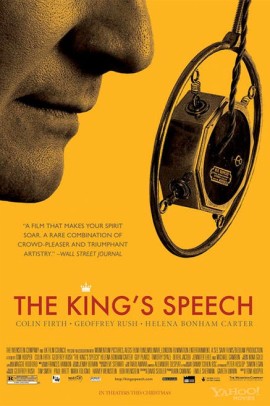The King’s Speech (2010)
Synopsis
This is a marvellous movie about King George VI’s speech impediment and the friendship which helped him overcome it. It tells us many important lessons about the clearing of past trauma, of the willingness to defy conventions in service of the greater good and the journey a man must travel to fulfill his destiny – to inspire the weary hearts of a people at war.

| Genre | Drama |
| Production year | 2010 |
| Director | Tom Hooper |
| Male actors | Colin Firth, Geoffrey Rush, Guy Pearce, Michael Gambon |
To fulfill your destiny, you must first claim your voice
by Eivind Figenschau Skjellum
No warm bosoms in the Royal Palace
The best and most important scenes of “The King’s Speech” feature speech therapist Lionel and king to be Bertie (aka Prince Albert and soon to be King George VI) alone in some form of conversation. One of my most favourite of these scenes arrive after Bertie’s dad King George V has died. Bertie comes to Lionel’s eccentric-looking office in a damp London basement for support. At this point, they have already been working together for a while.
Lionel has accepted Bertie’s terms to not talk about any “personal nonsense”, yet made it clear that his demand will allow him to deal only with the surface of the problem. “That’s sufficient,” his wife Elizabeth says in a way that makes me laugh; the enormous emotional suppression of the English Royal family is here made funny.
But now, Bertie’s pain is huge, his desire for release greater still, and his trust for Lionel sufficient to enter into “personal nonsense” willingly.
Bertie has not flourished in the suffocating emotional atmosphere of the Royal Palace. We learn that Bertie didn’t see his parents much growing up and that his mother, an emotionally shut down woman, did not relate to him as such – the maternal duties were tended by a nanny, a seriously nasty woman by the sound of it, who would pinch him and withhold food.
Knowing the enormous need a boy has for his mother in the forming years, we can understand how desperate must Bertie’s need for intimacy and closeness be. To take a boy from his mother’s warm bosom as a child is tantamount to torture. That boy needs the safety and intimacy of Mummy to have a fighting chance to one day turn into a mature man.*
Clearing trauma
Bertie uses his right hand as the dominant one as he glues on the wings of a model biplane. It’s a pleasant diversion from the intensity of sharing his wounds with Lionel. Yet, as Lionel discovers, he is really left-handed. He was coerced to change that. Left-handers have traditionally been treated with suspicion; they do after all feature largely among artists, those right-brained people that all those who repress their archetypal Lover energy are so scared of. It’s a sad story.
It becomes clear that Bertie has been put through a lot of traumatic conditioning to move him away from his own nature, all the while being virtually without parental presence in his life. That, we understand, is the cause of his stammer. And we understand that all speech impediments have their source in some emotional trauma, for as Lionel assures us “no baby is born with a stammer”.
Bertie discharges a lot of his traumatic material through shaking and breathing exercises. Even more important is perhaps the swearing which he takes up, once he lets himself, in a delightfully gratuitous way (swearing consciously seems to access the Warrior archetype). And then there is the singing. “Try singing it,” says Lionel when the words fail Bertie. “Continual sound will give you flow.” It also gives you access to the Lover archetype, truly a strong one in Bertie (as it is in his Brother David, where it appears as the Addict).
Bertie’s flow – his natural being – has been completely disrupted as a child in one of the world’s most repressed families – the English Royal family.
Finding your voice in the presence of an affirming other
The aptly named “The King’s Speech” is a movie not just about the important speech Bertie – King George VI – delivers to the nation as England enters into war with Germany. It is also not, at its deepest level, really about his speech impediment. No, at its deepest level, it is an allegorical tale about a man’s journey to find his voice (become himself fully) as a prerequisite step for fulfilling his destiny on Earth.
We all carry trauma within ourselves. And this movie gives us some nice techniques to explore to discharge that (swearing, breathing, shaking, singing). But really, the true healer of wounds is the friendship between Lionel and King George VI. It shows us the enormous healing powers of authentic, loving relationship between men. Lionel and Bertie meet as peers and it is in that spirit of Brotherhood that Bertie’s wounds are laid bare. When we men share vulnerably our wounds with other men and find ourselves accepted and loved in spite of them (or truly, quite often, because of them), something heals in us, and we regain some of our voice.
The implications of the deep need for male soul bonding is most beautifully summarized when Lionel has to defend himself against the attempts of the King’s “helpers” to remove him from his duty. Lionel, you see, has no formal credentials. Yet, while he doesn’t have the credentials, he has the wisdom of lived life:
It’s true, I’m not a doctor. And yes, I acted. A bit. I recited in pubs, I taught in schools. When the great war came, all our soldiers were returning to Australia from the front, a lot of them shellshocked. Unable to speak. Somebody said “Lionel, you are very good at all this speech stuff. Do you think you could possibly help these poor buggers?”
I did muscle therapy, exercises, relaxation, but I knew I had to go deeper. Those poor, young blokes had cried out in fear and nobody was listening to them. My job was to give them faith in their own voice and let them know that a friend was listening. That must ring a few bells with you, Bertie?
The emotional weight and wisdom of these words shows us clearly that Lionel doesn’t suffer from the Fisher King wound, so clearly seen in e.g. the Archbishop.
A King’s destiny
Only when Bertie discharges, with Lionel’s help, much of the tensions of past traumas does he start accessing the King Archetype which waited powerful and dormant in his deep Self (his brother did not display the same King potential). And after he delivers the speech that signals the start of Englands trials in World War II, we see how his body and entire demeanor shift; he now walks with confidence, his inner masochist overcome.
Having claimed his voice, through an inner battle that now serves as metaphor for the outer battle which is about to start , and having had his victory observed by the entire British empire, his self-confidence surfaces for the first time and he is ready, against all odds, to take on the duty which has been thrust upon him – leading a country at war.
*I read some research about a young boy’s need for his mother once. It claimed that a boy needs his mother more than does a girl in the early years. If this is true, the need for breaking away from the world of archetypal Mother at some point in life becomes all the greater. If someone knows this research, please help me remember where I found it in the comments below.
Powerful ideas from The King’s Speech
- Bertie's true healing only started once he dared share the most vulnerable parts of his childhood with a trustworthy, good man.
- The friendship between Lionel and Bertie became a huge factor in the victory of the Allied forces over the 3rd Reich.
- The coercion of Bertie to write with his right hand as opposed to his left did, together with other important factors, create so much trauma in him that only Lionel saved him from becoming a weakling King whose impotent rule could potentially have cost the Allied forces the war. Let that stand as testament to the interconnectedness of all things – Bertie's writing arm and our freedom from nazi tyranny.
- Swearing, singing, shaking and breathing will help clear you of trauma (because "the issues get stuck in the tissues").
- Only by defying convention could Lionel truly help Bertie. Had he served the interests of the power that be, Bertie would not have healed.
- One of the greatest gifts you can give a man is your loving presence as he shares his wounds with you in confidence
- On one level, most of us have speech impediments, not all as severe as a stammer. Perhaps your voice becomes constricted, squeaky or flat when you need to assert yourself and draw a line in the sand? Let's be blunt about it – do you have a speech impediment of some sort that prevents you from living your purpose? If yes, what are you going to do about it?







